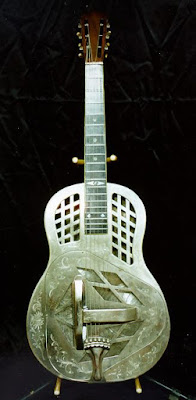 |
| Or so they say... |
If you watch Netflix’s Robert Johnson: Devil at the Crossroads, you’ll get a taste of how much of the legendary blues artist’s reputation rests on a mix of rumor and projection. It’s worth the time, if for the interviews alone, but that documentary (part of their Remastered series?) also confirms most of what I read about Johnson around the web, but I’ll be damned if I can keep up with them for visuals…
The biggest surprise I found when researching Robert Johnson was how few recordings he left behind: Wikipedia puts the number at just 29 songs, if with 13 alternate takes over his entire career. That just builds the legend, of course, but the way people wax about both his voice and his playing points to something heard only by people with the right kind of ears. After a week plus with his catalog, I hear the singular voice, but I'm taking the rest on faith. (And Wikipedia has some good notes on his musicianship and the quality of his voice and his use of “microtonality” in the depths of its entry.) With that, time to introduce the man himself…
Robert Johnson was the 11th child in a family, most born out of wedlock, but he still had a good anchor in his life. Charles Dodds, the man who raised him, did pretty well for himself between managing land and making furniture - too well for prominent local whites in Hazelhurst, Mississippi. His success came at the right before one of those spikes of White resentment that, unfortunately, seem baked into the American DNA, so Dodds fled town on threat of lynching. He left behind his wife, Julia, who reconnected with Johnson’s biological father, Noah Johnson, but he stepped out of the picture again before long. Johnson eventually reconnected with Dodds wtih a move to Memphis, Tennessee. Having learned the terrible lesson of the times, Dodds had adopted a new identity as Charles Spencer. Johnson carried the Spencer name through his childhood.
Most sources agree Robert Johnson lived in Memphis for a while. Most also agree he had some decent state-provided education during that time, but only one source offers anything concrete that hints at his love for music: that’s Blackpast.org, who references people who remember him playing a diddley-bow, i.e., “…wire attached to nails sticking out of houses. A person could then hit the wire with a stick and use an empty bottle that slides along the wire to change the pitch.” The story picks up with Johnson following Son House and Blind Willie Johnson around the blues juke joint circuit asking for tips on how to play. Son House (covered earlier in this series) recalls that, while Johnson wasn’t too bad on the harmonica, he wasn’t so good on the guitar:
“such a racket you’d never heard!… ‘Get that guitar away from that boy,’ people would say, ‘he’s running people crazy with it.’”
The biggest surprise I found when researching Robert Johnson was how few recordings he left behind: Wikipedia puts the number at just 29 songs, if with 13 alternate takes over his entire career. That just builds the legend, of course, but the way people wax about both his voice and his playing points to something heard only by people with the right kind of ears. After a week plus with his catalog, I hear the singular voice, but I'm taking the rest on faith. (And Wikipedia has some good notes on his musicianship and the quality of his voice and his use of “microtonality” in the depths of its entry.) With that, time to introduce the man himself…
Robert Johnson was the 11th child in a family, most born out of wedlock, but he still had a good anchor in his life. Charles Dodds, the man who raised him, did pretty well for himself between managing land and making furniture - too well for prominent local whites in Hazelhurst, Mississippi. His success came at the right before one of those spikes of White resentment that, unfortunately, seem baked into the American DNA, so Dodds fled town on threat of lynching. He left behind his wife, Julia, who reconnected with Johnson’s biological father, Noah Johnson, but he stepped out of the picture again before long. Johnson eventually reconnected with Dodds wtih a move to Memphis, Tennessee. Having learned the terrible lesson of the times, Dodds had adopted a new identity as Charles Spencer. Johnson carried the Spencer name through his childhood.
Most sources agree Robert Johnson lived in Memphis for a while. Most also agree he had some decent state-provided education during that time, but only one source offers anything concrete that hints at his love for music: that’s Blackpast.org, who references people who remember him playing a diddley-bow, i.e., “…wire attached to nails sticking out of houses. A person could then hit the wire with a stick and use an empty bottle that slides along the wire to change the pitch.” The story picks up with Johnson following Son House and Blind Willie Johnson around the blues juke joint circuit asking for tips on how to play. Son House (covered earlier in this series) recalls that, while Johnson wasn’t too bad on the harmonica, he wasn’t so good on the guitar:
“such a racket you’d never heard!… ‘Get that guitar away from that boy,’ people would say, ‘he’s running people crazy with it.’”
